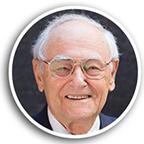Born in Berlin, Germany, Feigl and his parents eventually fled to Vichy France to escape the Nazis. In summer 1942, the Vichy government, in collaboration with the Nazis, began rounding up Jews and deporting them to German concentration camps in Poland. On Aug. 26, 1942, unbeknownst to Feigl, who was in a Quaker summer camp, his parents were arrested and deported to Auschwitz, where they were killed within a month of their arrival.
With the help of the Quakers, Feigl was sent to the predominantly Protestant village of Le Chambon-sur-Lignon. Sheltered in the surrounding area were nearly 5,000 people, among whom were 3,500 Jews, including many children. In the village, Feigl was given false identity papers and sent as a boarding student to a high school in Figeac, France. From there, after escaping arrest during a German raid in May 1944, Feigl escaped to neutral Switzerland over barbed wire fences with the help of the Jewish underground.
Feigl immigrated to the U.S. in July 1946, where he served three years in the U.S. Air Force. For 35 years, Feigl pursued a career in international sales of aircraft and related services in the private sector and spent more than five years as a senior negotiator in the Office of the Secretary of Defense. Since retiring, Feigl has traveled around the world speaking about his experiences and two diaries he wrote detailing his experiences during the Holocaust. In 1954, Feigl married Leonie Warschauer, and they have two daughters. He is now a volunteer at the United States Holocaust Memorial Museum. He is the author of the book, One Man, Two Voices: Peter Feigl’s Diary and Testimony.

